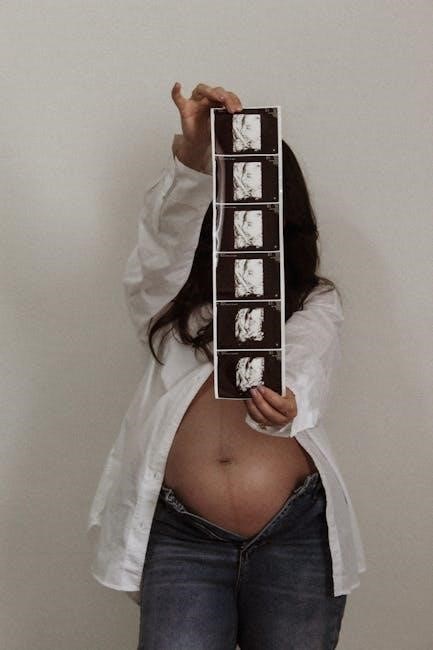pdf the immortal life of henrietta lacks
Henrietta Lacks‚ a Black tobacco farmer‚ unknowingly contributed to medical history when her cancer cells were taken in 1951‚ creating the immortal HeLa cell line․
1․1․ Who Was Henrietta Lacks?
Henrietta Lacks was a Black tobacco farmer and mother of five who died of cervical cancer in 1951 at age 31․ Her cancer cells‚ taken without her consent‚ became the HeLa cell line‚ revolutionizing medicine․ Born in 1920‚ Henrietta grew up in poverty and faced racial discrimination․ Her story‚ uncovered by Rebecca Skloot‚ highlights issues of race‚ class‚ and medical ethics‚ revealing how her cells impacted science while her family remained unaware of her legacy for decades․
1․2․ The Discovery of HeLa Cells
The HeLa cells were discovered when Henrietta Lacks sought treatment for cervical cancer at Johns Hopkins in 1951․ Without her knowledge‚ surgeon Dr․ Lawrence Wharton Jr; collected tissue samples from her tumor․ These cells were given to researcher Dr․ George Gey‚ who found they thrived and multiplied indefinitely‚ unlike other cells․ This unique quality made HeLa cells a groundbreaking tool for medical research‚ leading to countless scientific advancements and becoming a cornerstone of modern medicine․

Historical Context of Medical Ethics and African Americans
The history of medical ethics involving African Americans reveals a troubling legacy of exploitation‚ including the infamous Tuskegee Syphilis Study and forced medical experimentation․
2․1․ Ethical Issues in Medical Research
Medical research has historically faced ethical dilemmas‚ particularly regarding informed consent and exploitation of marginalized groups․ Henrietta Lacks’ case highlights these issues‚ as her cells were taken without her knowledge‚ raising questions about patient autonomy and the commodification of biological materials․ The lack of transparency and respect for her rights underscores systemic ethical failures in research practices‚ especially concerning African Americans and low-income patients․
2․2․ African Americans and Medical Experimentation
African Americans have long been subjected to unethical medical experimentation‚ often without consent or fair treatment․ The case of Henrietta Lacks exemplifies this‚ as her cells were taken without her knowledge‚ echoing historical injustices like the Tuskegee Syphilis Study․ Such practices reflect systemic racism and exploitation‚ where vulnerable communities bear the burden of advancing medical science without receiving adequate recognition or compensation‚ perpetuating mistrust in the medical system․

The Discovery and Significance of HeLa Cells
The discovery of HeLa cells by Dr․ George Gey revolutionized medical research‚ providing immortal cells that significantly advanced cancer treatment‚ vaccine development‚ and scientific understanding․
3․1․ The Role of Dr․ George Gey
Dr․ George Gey‚ a Johns Hopkins surgeon‚ discovered Henrietta Lacks’ unique cancer cells and cultivated them into the HeLa cell line․ Recognizing their potential‚ he shared the cells freely with researchers‚ accelerating medical advancements without personal gain․ His actions laid the foundation for countless scientific breakthroughs‚ though they also raised ethical concerns about patient consent and the commercialization of biological materials․
3․2․ Impact on Medical Research
The HeLa cells revolutionized medical research‚ enabling breakthroughs in cancer treatment‚ vaccines‚ and gene mapping․ They were crucial in developing the polio vaccine and understanding cellular behavior․ Researchers used HeLa cells to test drugs‚ study viruses‚ and explore the effects of radiation․ Their immortality allowed for unlimited experimentation‚ making them a cornerstone of modern medicine and paving the way for numerous scientific advancements that continue to save lives today․
Ethical Implications and Lack of Consent
In 1951‚ Henrietta Lacks’ cells were taken without consent‚ leading to the HeLa cell line and raising significant ethical concerns about patient rights and medical exploitation․
4․1․ Informed Consent in the 1950s
In the 1950s‚ informed consent was not rigorously enforced‚ especially for African American patients․ Henrietta Lacks’ cells were taken without her knowledge‚ reflecting the era’s lax medical ethics․
4․2․ Ethical Concerns Raised by HeLa Cells
The HeLa cells sparked significant ethical debates regarding patient rights and consent․ Henrietta Lacks’ family only learned of the cells’ use decades later‚ raising questions about racial disparities and medical exploitation;

The Book’s Narrative and Rebecca Skloot’s Contribution
Rebecca Skloot’s book sheds light on Henrietta Lacks’ story‚ uncovering ethical dilemmas and her family’s journey‚ while highlighting the legacy of HeLa cells in science․
5․1․ Rebecca Skloot’s Role in Uncovering Henrietta’s Story
Rebecca Skloot dedicated over a decade to uncovering Henrietta Lacks’ story‚ conducting extensive research and interviews․ Her book‚ The Immortal Life of Henrietta Lacks‚ reveals the ethical complexities surrounding HeLa cells․ Skloot’s work brought Henrietta’s legacy to light‚ exposing the lack of consent and the profound impact of her cells on science․ Through her meticulous storytelling‚ Skloot highlighted the intersection of race‚ class‚ and medical ethics‚ ensuring Henrietta’s story is remembered and honored․
5․2․ The Lacks Family’s Journey
The Lacks family faced decades of unawareness and struggle following Henrietta’s death․ They only learned about HeLa cells’ significance years later‚ grappling with feelings of betrayal and injustice․ Deborah Lacks‚ Henrietta’s daughter‚ became a vocal advocate‚ seeking recognition and justice for her mother’s contribution․ The family’s journey from obscurity to acknowledgment highlights the ethical dilemmas and racial disparities in medical research‚ ultimately leading to a path of healing and advocacy․

Impact on Medical Research and Advancements
HeLa cells revolutionized medicine‚ aiding in polio vaccine development and cancer research․ Their immortality enabled countless scientific breakthroughs‚ transforming our understanding of human biology and disease treatment․
6․1․ Role in the Polio Vaccine
The HeLa cells played a pivotal role in the development of the polio vaccine․ Dr․ Jonas Salk utilized these cells to test the vaccine’s efficacy and safety․ The cells’ unique ability to grow indefinitely in the lab made them ideal for large-scale production and testing․ This contribution was instrumental in the successful distribution of the polio vaccine‚ leading to the near eradication of the disease worldwide․ The HeLa cells’ role in this breakthrough highlights their significance in advancing public health and saving countless lives․
6․2․ Contributions to Cancer Research
Henrietta Lacks’ HeLa cells revolutionized cancer research by providing scientists with a sustainable model to study the disease․ These cells were used to explore cancer’s genetic and molecular mechanisms‚ enabling breakthroughs in understanding tumor growth and metastasis․ Researchers tested various treatments‚ accelerating the development of chemotherapy drugs and targeted therapies․ The HeLa cells’ resilience and reproducibility made them invaluable‚ contributing to numerous studies that have improved cancer diagnosis‚ treatment‚ and patient outcomes globally․ Their impact remains central to ongoing cancer research initiatives․
The Lacks Family’s Perspective and Recognition
The Lacks family faced a long struggle for recognition of Henrietta’s contribution․ They expressed emotional pain over her unmarked grave and the exploitation of her legacy‚ seeking acknowledgment and justice for her impact on science and humanity․
7․1․ The Family’s Struggle for Recognition
The Lacks family endured decades of emotional turmoil‚ unaware of Henrietta’s cells’ significance until 20 years after her death․ They grappled with poverty and lack of acknowledgment‚ feeling exploited as her cells generated vast profits․ The family sought justice‚ questioning the ethics behind the unauthorized use of her cells․ Their struggle highlighted systemic racial disparities and sparked conversations about medical ethics and patient rights‚ ultimately leading to increased advocacy for informed consent in scientific research․

7․2․ Modern Recognition and Honors
Henrietta Lacks gained widespread recognition through Rebecca Skloot’s book and the HBO film starring Oprah Winfrey․ Her story sparked global awareness‚ honoring her legacy as a pivotal figure in medical history․ The Lacks family‚ once unaware of her impact‚ now advocates for ethics in research․ Henrietta’s contributions are celebrated in science and culture‚ inspiring educational initiatives and discussions on bioethics․ Her immortality extends beyond cells‚ as her story continues to educate and inspire future generations about the intersection of science‚ race‚ and humanity․

Legal and Ethical Lessons Learned
The case of Henrietta Lacks highlights historical ethical failures in medical research‚ emphasizing the importance of informed consent and patient rights‚ now central to modern bioethics policies․
8․1․ Changes in Medical Ethics Policies
The story of Henrietta Lacks led to significant reforms in medical ethics‚ emphasizing patient autonomy and informed consent․ Her case highlighted the need for clear guidelines regarding tissue sampling and patient rights‚ prompting the establishment of institutional review boards (IRBs) to oversee research involving human subjects․ These changes ensure that patients are fully informed and their consent is obtained before any medical procedures or research․ The case also spurred broader discussions about racial disparities in healthcare and the ethical treatment of marginalized communities‚ reshaping modern bioethical standards and practices․

8․2․ Legal Implications for Future Research
The Henrietta Lacks case has had profound legal implications‚ influencing how human tissue is used in research․ Laws now require explicit consent for tissue sampling and commercialization‚ protecting patient rights․ Researchers must disclose how tissues will be used‚ ensuring transparency․ This shift has led to stricter regulations and accountability‚ balancing scientific progress with ethical considerations․ Legal frameworks now prioritize patient autonomy‚ preventing future exploitation and ensuring that individuals’ rights are upheld in medical advancements․
Cultural Legacy and Henrietta Lacks’ Recognition
Henrietta Lacks’ story‚ immortalized in Rebecca Skloot’s book and an HBO film‚ has transformed her into a cultural icon‚ raising awareness about medical ethics and racial disparities․
9․1․ Henrietta Lacks in Popular Culture
Henrietta Lacks’ story gained widespread recognition through Rebecca Skloot’s book and an HBO film starring Oprah Winfrey as her daughter Deborah․ The book has sparked global discussions on bioethics‚ race‚ and medical history‚ transforming Henrietta into a cultural icon․ Her legacy extends beyond science‚ inspiring art‚ documentaries‚ and public conversations about justice and consent․ Despite her humble beginnings‚ Henrietta’s impact on popular culture highlights her enduring relevance in modern society․

9․2․ Educational and Cultural Impact
Henrietta Lacks’ story‚ as detailed in Rebecca Skloot’s book‚ has profoundly influenced education and culture․ It sparked global debates on bioethics‚ race‚ and medical history‚ inspiring academic discussions and curriculum changes․ The story has also fueled artistic expression‚ from films to literature‚ and continues to educate people about the importance of informed consent and the intersection of science and humanity․ Henrietta’s legacy bridges science and society‚ making her story a cornerstone of ethical education and cultural reflection․
Henrietta Lacks’ story underscores the ethical complexities surrounding medical research‚ highlighting the enduring impact of her immortal cells on science and humanity․
10․1․ The Importance of Henrietta Lacks’ Story
Henrietta Lacks’ story is a pivotal moment in medical history‚ revealing the ethical complexities of scientific discovery․ Her immortal cells revolutionized research‚ yet her identity remained hidden for decades․ The lack of consent and transparency in her case highlights systemic racial and class disparities in healthcare․ Her legacy challenges ethical standards‚ inspiring reforms in medical research and patient rights․ Beyond science‚ Henrietta’s story humanizes the sacrifices behind progress‚ fostering conversations about race‚ class‚ and justice․ Her impact endures‚ reminding us of the importance of accountability and respect in scientific advancements․
10․2․ Ongoing Impact and Future Implications
Henrietta Lacks’ legacy continues to shape medical research‚ with HeLa cells remaining vital in advancing cancer treatments‚ vaccine development‚ and genetic studies․ Her story has sparked global conversations about bioethics‚ racial disparities‚ and patient rights․ Future research must prioritize informed consent and transparency‚ ensuring that Henrietta’s story inspires ethical practices․ Her immortal cells will forever symbolize the intersection of humanity and science‚ guiding future innovations while honoring her contributions to medical history; Her impact is timeless‚ influencing both scientific progress and societal change․